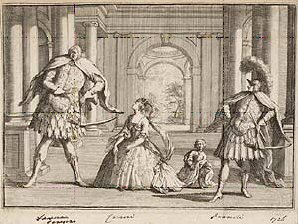Home Page
The latest articles, features and news.


All About...


Sponsored Links


Discussion Forums




Pecker Provisions


Condoms, lubes, pumps, stretchers, exercises, supplements, sports underwear and more.

Firefly Talks Dicks


Words of feminine wisdom about men's problems.

|
| | |
|

10 July 2006
The Castrati: Giving Up Your Balls For St Paul
by Paul Aitken
 Last June, at the annual year-end banquet for our middle-aged hockey squad, we had a little karaoke and, plied with liquor, I took a shot at a CSNY's Ohio. Now, I've got a fairly high voice, I can even sing some Police songs without breaking into falsetto and at the end of the song I hit a note that was pretty much at the top of my range. One of my teammates, John, exclaimed to much laughter: "Hey, man. You gotta start wearing a cup!" Funny guy that John. Funny, funny guy. I've also heard women tell men who are bugging them to lay-off, or they'll be "singing soprano." The operating assumption behind both of these quips is that a man deprived of his testicles will lose the masculine timbre in his voice. It isn't true of course. The deep resonant quality of a man's voice is the result of a thickening of the larynx that occurs mid-puberty. It's a one-way process and hacking off one's testicles post-puberty will do nothing to alter one's voice (although it's a sure fire cure for incipient male pattern baldness - just letting you know). But if those testicles are hived off pre-puberty, then the larynx will not thicken and the voice will remain high-pitched. This didn't happen to me of course. My remarkable alto-tenor voice is the product of hours and hours of intense vocal training while listening to my car radio.
Last June, at the annual year-end banquet for our middle-aged hockey squad, we had a little karaoke and, plied with liquor, I took a shot at a CSNY's Ohio. Now, I've got a fairly high voice, I can even sing some Police songs without breaking into falsetto and at the end of the song I hit a note that was pretty much at the top of my range. One of my teammates, John, exclaimed to much laughter: "Hey, man. You gotta start wearing a cup!" Funny guy that John. Funny, funny guy. I've also heard women tell men who are bugging them to lay-off, or they'll be "singing soprano." The operating assumption behind both of these quips is that a man deprived of his testicles will lose the masculine timbre in his voice. It isn't true of course. The deep resonant quality of a man's voice is the result of a thickening of the larynx that occurs mid-puberty. It's a one-way process and hacking off one's testicles post-puberty will do nothing to alter one's voice (although it's a sure fire cure for incipient male pattern baldness - just letting you know). But if those testicles are hived off pre-puberty, then the larynx will not thicken and the voice will remain high-pitched. This didn't happen to me of course. My remarkable alto-tenor voice is the product of hours and hours of intense vocal training while listening to my car radio.
But between 1600 and 1850, in the interests of producing men with high-pitched voices, thousands of Italian children were gelded like cattle. The mechanics of the operation went pretty much unchanged from the barn to the back-alley cellar. The boy was strapped to a table. A piece of twine was tied around his scrotum to cut off blood flow and a sharp knife or razor was used to slice off his testicles. The resulting wound was then cauterized with a red-hot poker or molten tar. The one concession to humanity was a dollop of liquor or opium to inhibit the pain, though often as not the practitioner would employ a technique of partial strangulation to render the child unconscious for the operation. If the kid survived the strangulation, the operation and the inevitable infection that followed, he would become - if he was very, very lucky - a member of the celebrated operatic elite known as the castrati.
No one knows where or when the practice of castrating boy singers began in Europe but the idea extends into antiquity. Singing eunuchs were a favorite of the ancient Persian courts and contemporary examples existed amongst the harem eunuchs of Middle Eastern cultures. Their introduction to Europe came about because of an edict by St. Paul that women should be silent in church. What St. Paul probably meant was that women shouldn't be mouthy about important things like theology, but the prohibition was applied literally. That meant no women were allowed to sing the top line in chapel choirs (they were also forbidden from performing on stage). And given the supposition that a high voice was purer and closer to God, one can see how the idea of an enduring child's voice delivered with the strength and craft of a man (who only had to be trained once) would appeal to the church.
Up to that point the church had to rely on boy singers and falsettos (think Tiny Tim) to deliver the high notes. Castrati were clearly an improvement. But how to obtain them? For most of the 16th century the church condemned the practice of castrating children. Castration was used as a punishment for criminals - rapists in particular - and to inflict the same on innocent children seemed... well, it's not what Jesus would do. So the church adopted a kind of "Don't ask � don't tell" policy. Talented boy singers found themselves to be victims of "barnyard accidents." "Wild boar attacks" were another favorite. And when admitted to the choir they were listed as falsettists. It was laughably hypocritical of course, but it served the interests of both the parents and the church to maintain the fiction.
This all changed in 1599 when Pope Clement heard one sing. He subsequently replaced all the falsettists with castrati in the Vatican choir and declared that castration was acceptable if it were undertaken "for the glory of God." From this point on, the number of castrati steadily increased, peaking in the early decades of the 18th century when at one point there were two hundred working in Rome alone, and thousands more spread throughout the European continent.
 It is difficult in modern times to appreciate the influence of the castrati during this period. It can be said without exaggeration that opera, as a musical form, was created for the castrati and indeed there are pieces of music written for the vocal stylings of castrati that cannot be sung today. The most celebrated castrati were the rock-stars of their time - rich, spoilt and powerful. The most famous, Farinelli (pictured), earned more for one opera performance than Handel earned for writing one. He had the ear of the king of Spain and by the end of his career was able to purchase a Dukedom in Italy.
It is difficult in modern times to appreciate the influence of the castrati during this period. It can be said without exaggeration that opera, as a musical form, was created for the castrati and indeed there are pieces of music written for the vocal stylings of castrati that cannot be sung today. The most celebrated castrati were the rock-stars of their time - rich, spoilt and powerful. The most famous, Farinelli (pictured), earned more for one opera performance than Handel earned for writing one. He had the ear of the king of Spain and by the end of his career was able to purchase a Dukedom in Italy.
As a consequence, many poor Italian families had a strong incentive to castrate their sons in the hopes of scoring big in the castrati lottery. They didn't for the most part. It has been estimated that fewer than 1 percent of castrated boys ended up with any kind of singing career. The other 99 percent went through life talking like Michael Jackson before eventually dying in poverty with no children to care of them. Most castrati were bitter, lonely and often as not the objects of derision. In a bi-gendered world they were androgynous outcasts.
 The lack of testosterone production during adolescence and beyond didn't just affect their voice, it also prevented the development of most of the characteristics (beards, chest hair, musculature etc.) that we associate with masculinity. The adult castrati had an underdeveloped penis and a female distribution of body fat - some castrati developed fatty breasts and buttocks. At puberty, the long bones in the arms and legs of boys stop growing because of the androgen hormone balance. In the castrati, this did not happen and so they developed disproportionately long and gangling arms and legs relative to their torso length, features accentuated in the numerous caricatures of the period. Small wonder then, that they had a reputation for bitchiness. It wasn't just the hormones talking, they were seriously pissed off!
The lack of testosterone production during adolescence and beyond didn't just affect their voice, it also prevented the development of most of the characteristics (beards, chest hair, musculature etc.) that we associate with masculinity. The adult castrati had an underdeveloped penis and a female distribution of body fat - some castrati developed fatty breasts and buttocks. At puberty, the long bones in the arms and legs of boys stop growing because of the androgen hormone balance. In the castrati, this did not happen and so they developed disproportionately long and gangling arms and legs relative to their torso length, features accentuated in the numerous caricatures of the period. Small wonder then, that they had a reputation for bitchiness. It wasn't just the hormones talking, they were seriously pissed off!
Interestingly though, and contrary to what one might expect, many castrati experienced an active sex-life. While their libidos were markedly low, most castrati were capable of erection and even ejaculation, though their ejaculate consisted solely of prostate fluid. The castrati were, without exception, infertile, and though it seems hard to imagine in the post-pill world of today, this condition led the more successful castrati to be much sought after by the noblewomen of Europe. For these women, accidental pregnancy was unthinkable. Child-sized penis be damned, the castrati were the 18th century equivalent of safe-sex.
The dominance of the castrati in the European music and social scenes continued until the end of the Baroque era (about the halfway point of the 18th century). Changes in operatic fashion moved away from the castrati and with the beginning of the enlightenment, philosophers such as Voltaire and Rousseau spoke out against the practice of castration, labeling it an "offence against nature." In 1790 the Pope revoked the ban on women performing on stage. This opened the doors to increased competition for the coveted soprano roles and audiences everywhere embraced the new female singers.
By the 19th century, the castrati had pretty much vacated the operatic scene. Only in the church did the castrati tradition remain, but even here they fell under siege of public condemnation. In 1870 the practice of castration was outlawed in the Papal States. In 1902, Pope Leo XIII banned the use of castrati in the Vatican forever. The last Vatican castrato was Alessandro Moreschi who died in 1922. His is the only example of castrati singing ever recorded. You can buy the record if you're really curious but I'd advise listening to it online first. Castratos may have been the toast of 18th century Europe but from what I could make out, the 1903 recording sounds a lot like Tiny Tim singing in Latin. And it's nowhere near as catchy as Tiptoe Through the Tulips. Guess you had to be there.
|
|